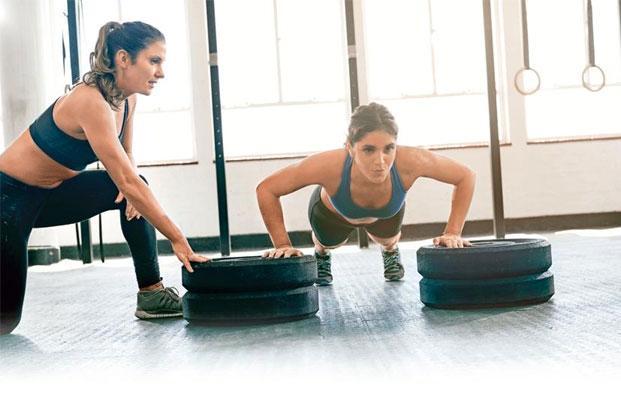Trainers are everywhere. On the Internet, suggested by friends, with specific expertise, in gyms, even at parties. They say impressive things, have certificates with complex acronyms and promise you a body like actor John Abraham’s in a few months. But finding the one that’s right for you is not an easy task. The key: Begin the search by figuring out your personal goals. And then ask all the right questions. Here are some to get you started.
Does s/he come recommended?
The best way to look for a trainer is through recommendations from people you know. “You get to know their experience, commitment, results, how encouraging they are, etc.,” says Bengaluru-based fitness expert Wanitha Ashok. However, you need to be a bit cautious. “Everyone is different in their unique ways and while word of mouth is really good, do not follow anything blindly,” says Vesna Pericevic Jacob, a physiotherapist and a Pilates teacher who owns Vesna’s Wellness in New Delhi. What works for someone might not work for you in terms of technique, approach or attitude. Post a recommendation, ask your own questions, cross-check, follow your instincts and make a decision based on your own expectations and experiences, says Jacob.
Does s/he understand your goal?
Mumbai-based fitness trainer Vinod Channa, who has clients like John Abraham, says you shouldn’t follow recommendations blindly. “Some trainer who has a great clientele base might end up pushing you too much with high-intensity or high-repetition workouts,” he says. The trainer should be interested not in what he wants to do but in what you want to achieve. “A good trainer will not only be in sync with your requirement according to your lifestyle, fitness level and genetics, but also extract your potential,” says Channa. For this, you need someone who is a positive motivator, who genuinely wants to help you achieve your goal.
What’s his qualification?
Twenty years ago, people would go to bodybuilders if they wanted trainers. Now, there are a lot of fitness certifications available internationally that you can check for. A bachelor’s in physical education is the formal degree, but a certification from Indian associations like the K11 Fitness Academy and Gym, Intellectual Fitness and Sports Academy , and Talwalkars Training Academy, also works. Other than this, certification from international associations like the American College of Sports Medicine, National Strength and Conditioning Association, US, and American Council on Exercise is good. ”These certification courses usually have an expiry date of two years from the date of completion of the course,” says Ali Irani, head of department, physiotherapy and sports medicine, Nanavati Super Speciality Hospital, Mumbai. “Always check the year they took the course,” says Dr Irani. Re-certification is required as research progresses and ways of training evolve.
Qualification is a good judge, but it’s not always necessary. “I have met some incredibly talented personal trainers who had no formal education,” says Jacob, adding that perhaps the best option is to opt for a trial session.
Can he apply his knowledge?
The trainer should not only have the latest scientific knowledge but should be able to apply it. “You need to be wary of certificate collectors who never implement the knowledge on themselves or the clients,” says Channa. The best instructors keep learning and mix up two or three techniques into their workouts. You can check this by asking for the variety of people the trainer has trained, the age groups, the lifestyle, etc. “Go with a senior trainer with at least five years of experience who is certified in different types of fitness techniques and has experience of handling different kinds of people,” says Channa.
What’s her specialization?
It’s a consumer’s market and there are a lot of specialized trainers for specific sports like running, soccer, basketball, tennis, or routines like Pilates or mixed martial arts. “Ask for their specialization,” says Samir Purohit, a fitness trainer who runs the Pilates and Altitude Training Studio in Mumbai. “Is she into yoga, functional training, Pilates, strength or cardio? Once you know, ask for the courses the trainer has attended in that workout and then decide.” A good trainer would be someone who keeps learning new techniques and adds them to the routines.
Is s/he aware of your limitations?
An experienced trainer will always ask you detailed personal questions before giving you a fitness regime. These include your age, height, weight, medical history, workout history, if any, etc. In addition, the trainer will also ask for your daily diet, sleep patterns, basic lifestyle, type of profession before s/he sets a fitness goal and a diet for you. You should be completely honest about everything, especially your medical history. “The trainer needs to know of the various pathologies and ailments that you’re suffering from,” says Ali Irani of Nanavati Super Speciality Hospital, “and have enough knowledge regarding the do’s and dont’s in terms of exercise and nutrition in those conditions.” In fact, a good test for a trainer is his willingness to work with your consulting doctor, physiotherapist and nutritionist for maximum results, says Madhuri Ruia, a nutritionist who runs InteGym in Mumbai and is a ‘Mint’ columnist.
Is the programme customized?
Sometimes trainers recommend the same fitness regime for all their clients. This is not advisable. If your trainer spends the whole of the first session assessing your fitness, asking you at least 15-20 questions about your past fitness history and your current fitness level, and makes copious notes, that might mean s/he is taking time out to create a customized fitness programme, says Dr Irani. It’s easy to give you high-repetition or high-intensity workouts but a good trainer will adjust the workout to your need.
How much does it cost?
Every gym charges according to the facilities available and the experience of the trainer.
====================================
For complete article, head to livemint.com

